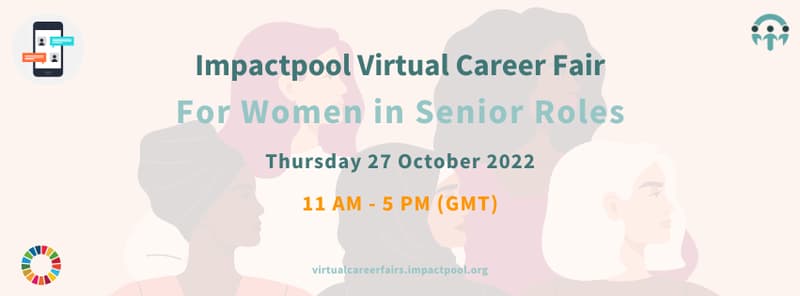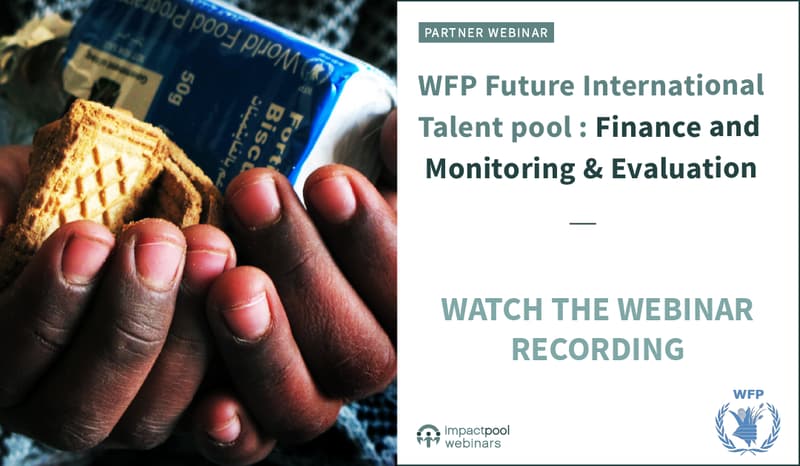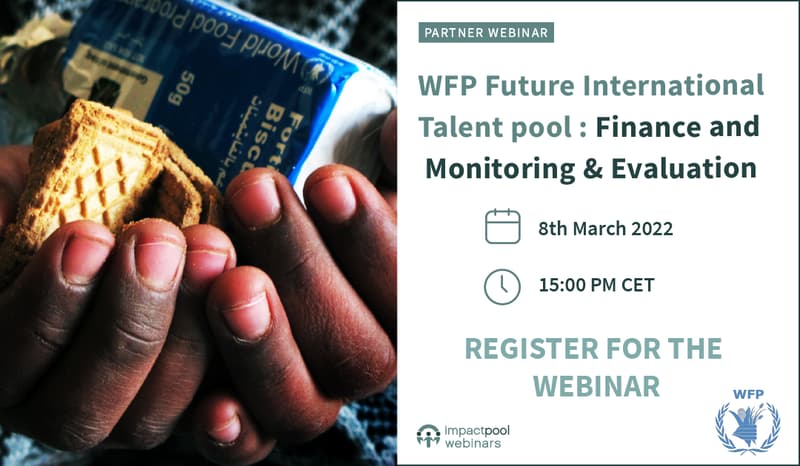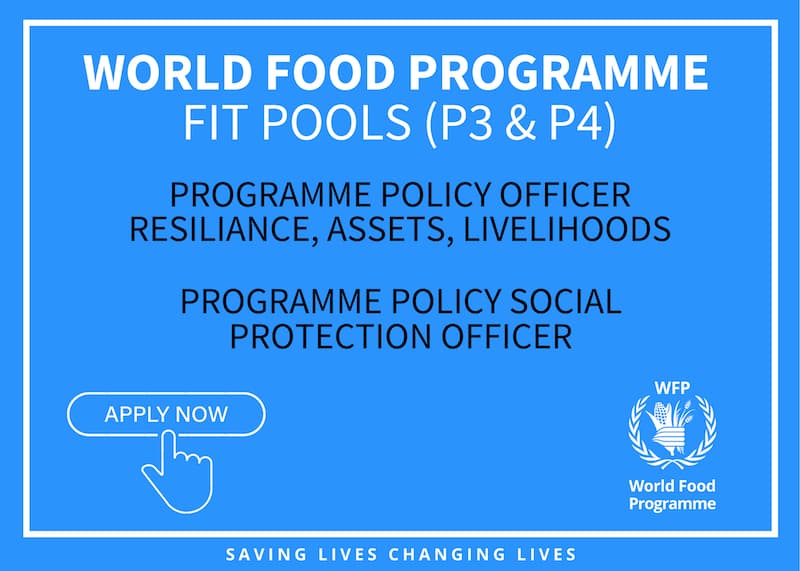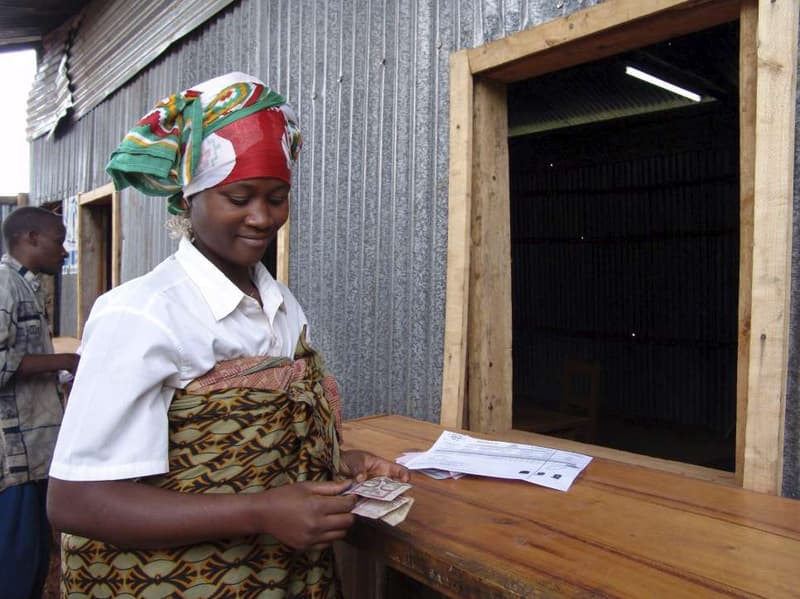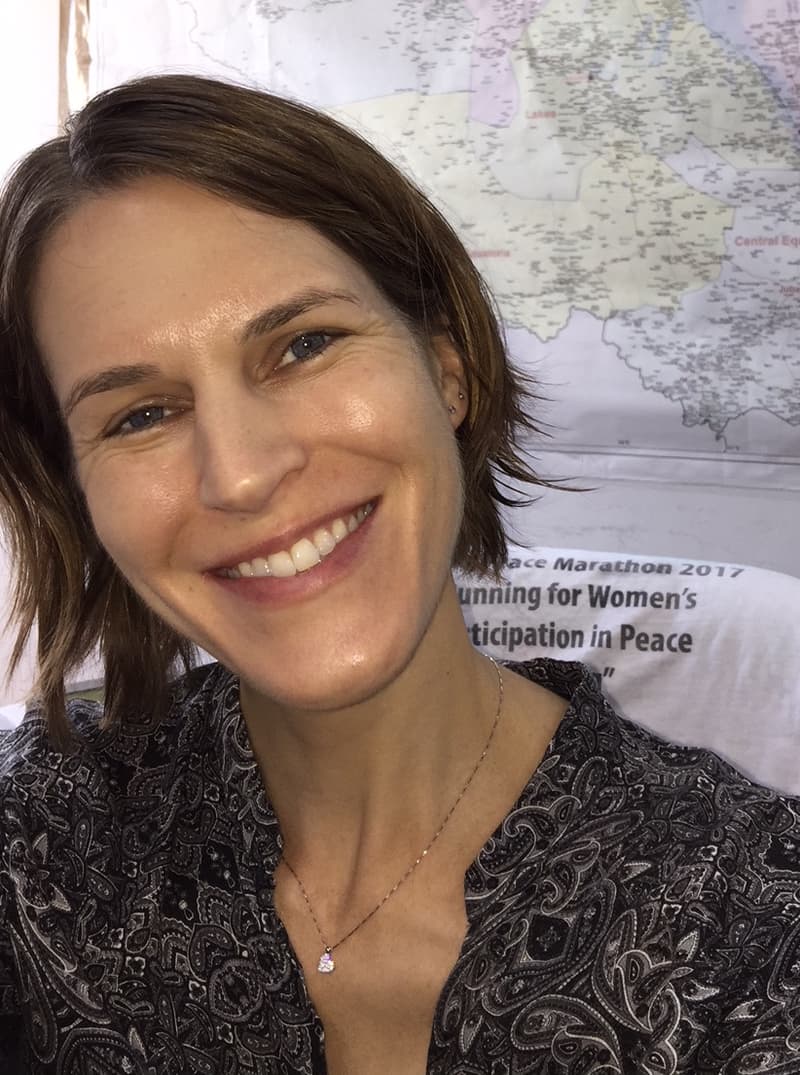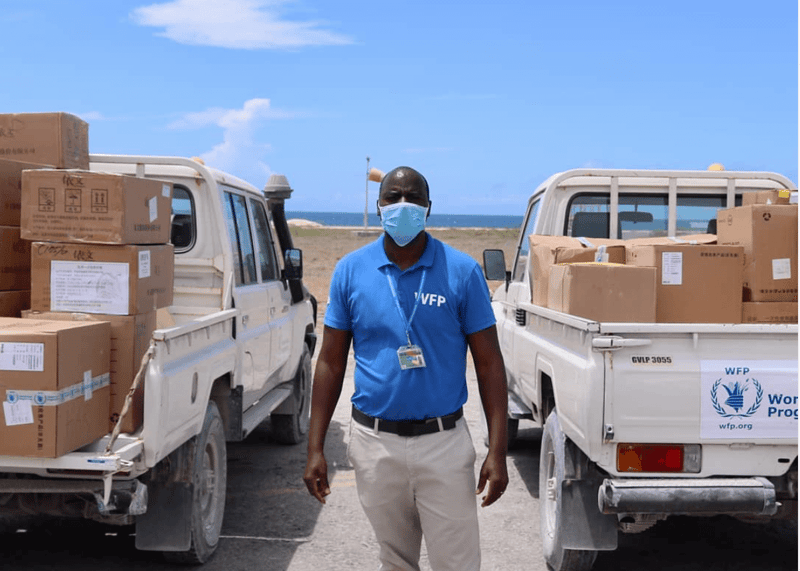Programme Policy Officer (Social Protection and Urban Safety Nets), NOB - Juba South Sudan
South Sudan
- Organization: WFP - World Food Programme
- Location: South Sudan
- Grade: Junior level - NO-B, National Professional Officer - Locally recruited position
-
Occupational Groups:
- Social Affairs
- Legal - Broad
- Political Affairs
- Infrastructure and Urban-Rural development
- Security and Safety
- Civil Society and Local governance
- Urban Development, planning and design
- Project and Programme Management
- Closing Date: 2023-12-04
VACANCY ANNOUNCEMENT JRNO. 830403
|
JOB TITLE: |
National Programme and Policy Officer – Social Protection/Urban Safety Nets |
|
TYPE OF CONTRACT: |
Fix Term NOB |
|
UNIT/DIVISION: |
Food Systems and Resilience, Programme |
|
DUTY STATION (City, Country): |
Juba, South Sudan |
|
DURATION: |
1 year |
.
WFP celebrates and embraces diversity. It is committed to the principle of equal employment opportunity for all its employees and encourages qualified candidates to apply irrespective of race, colour, national origin, ethnic or social background, genetic information, gender, gender identity and/or expression, sexual orientation, religion or belief, HIV status or disability.
ABOUT WFP
The United Nations World Food Programme (WFP), a highly prestigious, reputable & world’s largest humanitarian organization, operating in more than 120 countries and territories, bringing life-saving assistance in emergencies, building pathways to peace, stability and prosperity for people recovering from conflict, disasters and the impact of climate change and supporting sustainable and resilient livelihoods for a world with zero hunger.
At WFP, people are at the heart of everything we do and the vision of the future WFP workforce is one of diverse, committed, skilled, and high performing teams, selected on merit, operating in a healthy and inclusive work environment, living WFP's values (Integrity, Collaboration, Commitment, Humanity, and Inclusion) and working with partners to save and change the lives of those WFP serves.
The United Nations World Food Programme is the world's largest humanitarian agency fighting hunger worldwide. The mission of WFP is to help the world achieve Zero Hunger in our lifetimes. Every day, WFP works worldwide to ensure that no child goes to bed hungry and that the poorest and most vulnerable, particularly women and children, can access the nutritious food they need.
ORGANIZATIONAL CONTEXT
South Sudan is one of the least developed countries in the world. This newest country on the African continent has vast natural resources, rich cultures, and a young population, key ingredients for growth and prosperity. However, after independence in 2011, civil war and persistent communal violence have kept the country in protracted crises, destroying infrastructure and people’s livelihoods, reducing social services, causing displacement, and increasing humanitarian needs. The 2018 revitalized peace agreement put an end to large scale violence, giving hope for state building and recovery. Yet, the COVID-19 pandemic, consecutive years of unprecedented flooding, increased occurrence of dry spells and drought, and the Russia-Ukraine war have further strained the coping capacities of national and subnational institutions, communities, and people. As a result, humanitarian needs keep rising, and resourcing gaps continue widening. In 2023, 9.4 million people, 76 percent of the population, are said to be in need of humanitarian support (source: Humanitarian Needs Overview).
Humanitarian support is vital for meeting immediate needs of the most vulnerable in a highly fragile country such as South Sudan. However, its short-term nature and unpredictability of resources have limitations to addressing the root causes of vulnerabilities amongst communities and people. Reasons for vulnerabilities vary depending on the age, gender, disabilities, poverty, etc. Therefore, social protection, which is a government system, addresses the needs of people throughout their life cycle, and is adapting to shocks, is a desired sustainable solution to protecting the most vulnerable, promoting household and community resilience capacities to shocks, and transforming societies through human capital development.
South Sudan’s social protection system is nascent. The Ministry of Gender, Child and Social Welfare (MoGCSW) is responsible for inter-ministerial and government and partner coordination in social protection. Social assistance is mainly provided through non-government actors, including WFP. There is a momentum within the government and non-government partners to support social protection systems strengthening. This includes policy review, institutional capacity development, financial and implementation support for national programmes, and coordination of government and non-government programmes to promote harmonized approaches, avoid duplication, and provide technical assistance with a common vision. WFP is committed to playing such an enabling role along with other social protection partners by sharing good practices and learning from the delivery of WFP’s social assistance programmes, advocating for linkages between emergency assistance to social protection, and providing technical support in national programme design and management information systems.
ORGANIZATIONAL CONTEXT CONTINUED
WFP South Sudan’s operation is guided by the 2023 to 2025 Country Strategic Plan. The strategy has five pillars: 1) access to food, 2) human capital, 3) food systems and resilience, 4) systems strengthening; and 5) support to the humanitarian community. The Food Systems and Resilience (FSR) Unit is responsible for Urban Safety Nets (USN) under Pillar 2; Asset Creation and Livelihoods (ACL) - Productive Safety Nets - and Smallholder Agricultural Market Support (SAMS) under Pillar 3, and Social Protection systems strengthening under Pillar 4. General food assistance under Pillar 1 is WFP’s largest programme. WFP is expanding non-emergency programmes to address the root causes of hunger and conflict and shift shock-prone and vulnerable communities and households from relief to social assistance and resilience building. Lastly, WFP is undergoing the USN programme review to inform areas of improvement in the design, implementation modalities, and operational tools to adapt its social safety net (SSN) approach to different contexts as the WFP programme footprint becomes consolidated in hard-to-reach, highly food-insecure areas in South Sudan.
JOB PURPOSE
To provide support to policy and programme activities that effectively meet food assistance needs.
KEY ACCOUNTABILITIES (not all-inclusive)
Under direct supervision of the Head of FSR, the National Programme and Policy Officer – Social Protection will coordinate WFP’s direct implementation in SSN, act as the technical lead in WFP’s engagement with government and non-government social protection partners, and work with internal units to provide technical assistance to the government in social protection. More specifically, the National Programme and Policy Officer will:
- Develop an annual work plan based on WFP South Sudan’s roadmap for support to national social systems strengthening;
- Act as the technical lead in revising WFP’s SSN approach in direct programme implementation based on the outcome of the USN programme review;
- Coordinate the SSN programme implementation across the country with clearly articulated strategic direction, annual priorities, activities, and targets with other technical units and the Field Offices;
- Proactively identify implementation capacity gaps within the Field Offices and cooperating partners and support in strengthening their capacities through training, mentorship, additional guidance materials, and support missions;
- Ensure timely and accurate management of donor funds for the SSN programme and social protection systems strengthening;
- Coordinate with the Monitoring, Evaluation, Accountability and Learning (MEAL) Unit and the Field Offices to ensure the collection and analysis of quality information and data in the SSN implementation and conduct periodic reviews to apply adaptive programming;
- Coordinate a shift towards adaptive and shock-responsive social assistance across the WFP programme portfolio based on evidence and learning from South Sudan and other operations in collaboration
KEY ACCOUNTABILITIES CONTINUED
- Participate in internal coordination platforms and discussions to promote programme integration, especially sequencing emergency assistance onto SSN, provide updates on the status of the SSN implementation and social protection systems strengthening, conduct assessments and reviews, and contribute to WFP senior-level engagement with the government, donors, UN partners, and other stakeholders;
- Liaise with the Regional Bureau Social Protection Unit to provide updates on South Sudan’s operation, seek technical guidance, learn from other countries, and contribute to WFP’s global and regional learning agenda on support to national social protection systems;
- Develop a joint annual workplan with MoGCSW for WFP’s support to social protection policy, coordination, research and assessment, programme design and management, information systems, as well as resource mobilization;
- Build and strengthen collaboration and partnerships with other social protection actors for complementarity, information and knowledge sharing, harmonized approaches, as well as coordinated technical assistance to national and subnational institutions based on a common understanding of capacity needs;
- Contribute to national policy discussions and participate in coordination fora, share knowledge and experience from WFP social assistance programme implementation, advocate for increased technical capacities and financial resources for national social and productive safety nets, and support strengthening the social protection system, programmes, and management information systems in coordination with other technical units and social protection partners;
- Lead in drafting, or contribute to, high quality and analytical funding proposals, reports, briefs, and visibility materials for the SSN programme and social protection systems strengthening for advocacy, resource mobilization, and knowledge and information sharing.
- Any other duties as required.
STANDARD MINIMUM QUALIFICATIONS
|
Education: |
Advanced university degree or university degree with experience and training/courses in one or more of the following disciplines: economics, social policy, international development, or related disciplines |
|
Experience: |
A minimum of three years post graduate with progressively responsible work experience in social assistance, cash-based programming, policy and advocacy, youth livelihoods, and women’s empowerment |
STANDARD MINIMUM QUALIFICATIONS CONTINUED
|
Knowledge & Skills: |
Demonstrated ability to prepare concise and well-written programme documents (e.g., proposals, reports, briefs, and presentations) in English Proficiency in computer programmes: e.g., Word, Excel, and PowerPoint Competencies: cognitive capacity, teamwork, action management, innovation, partnerships, and client orientation |
|
Languages: |
Proficiency in English, oral and written (level c) |
4Ps CORE ORGANISATIONAL CAPABILITIES
Purpose
- Understand and communicate the Strategic Objectives: Understands WFP’s Strategic Objectives and the link to own work objectives.
- Be a force for positive change: Flexibly adapts individual contributions to accommodate changes in direction from supervisors and internal/external changes (such as evolving needs of beneficiaries, new requirements of partners).
- Make the mission inspiring to our team: Recognizes and shares with team members the ways in which individual contributions relate to WFP’s mission.
- Make our mission visible in everyday actions: Sets own goals in alignment with WFP’s overall operations, and is able to communicate this link to others.
People
- Look for ways to strengthen people's skills: Assesses own strengths and weaknesses to increase self-awareness, and includes these in conversations on own developmental needs.
- Create an inclusive culture: Participates in open dialogue, and values the diverse opinion of others, regardless of background, culture, experience, or country assignment.
- Be a coach & provide constructive feedback: Proactively seeks feedback and coaching to build confidence, and develop and improve individual skills.
- Create an “I will”/”We will” spirit: Participates in accomplishing team activities and goals in the face of challenging circumstances.
Performance
- Encourage innovation & creative solutions: Shows willingness to explore and experiment with new ideas and approaches in own work.
- Focus on getting results: Consistently delivers results within individual scope of work on time, on budget and without errors.
- Make commitments and make good on commitments: Commits to upholding individual accountabilities and responsibilities in the face of ever-changing country or functional priorities.
- Be Decisive: Makes rational decisions about individual activities when faced with uncertain circumstances, including in times of ambiguity regarding information or manager direction.
Partnership
- Connect and share across WFP units: Seeks to understand and adapt to internal or cross-unit teams’ priorities and preferred working styles.
- Build strong external partnerships: Demonstrates ability to understand and appropriately respond to and/or escalate needs of external partners.
- Be politically agile & adaptable: Portrays an informed and professional demeanor toward internal and external partners and stakeholders.
- Be clear about the value WFP brings to partnerships: Provides operational support on analyses and assessments that quantifies and demonstrates WFP’s unique value as a partner.
FUNCTIONAL CAPABILITIES
| Capability Name | Description of the behaviour expected for the proficiency level |
| Programme Lifecycle & Food Assistance | Displays ability to identify the main hunger problem at the national or subnational level to design and implement context-specific programmes that integrate complex analysis and the full range of food assistance tools. |
| Transfer Modalities (Food, Cash, Voucher) | Demonstrates ability to analyse and consolidate quantitative and qualitative information from different sources (e.g., market studies) to inform transfer modality selection and programme development. |
| Broad Knowledge of Specialized areas (i.e. Nutrition, VAM, etc.) | Demonstrates the ability to interpret basic data in the context of WFP specialised fields to contribute to technical programme design, implementation and monitoring. |
| Emergency Programming | Displays ability to translate understanding of programme principles in emergencies and protracted conflict situations into relevant, effective, and context specific approaches. |
| Strategic Policy Engagement w/ Government | Develops thorough recommendations using multiple inputs (e.g., government counsel, research, own experience) to strengthen national or subnational entities and government owned food and nutrition security programmes. |
DELIVERABLES AT THE END OF THE CONTRACT:
- Annual workplan developed, implemented, and reviewed
- SSN programme guidance developed/updated, disseminated, and put to use
- SSN footprint expanded in hard to reach areas with increased resources and integrated/coordinated with other WFP and partner programmes
- Joint annual workplan with MoGCSW developed, implemented, and reviewed
- Strategic and implementation partnerships in SSN and social protection systems strengthening established and strengthened
- WFP represented in government and partner social protection coordination fora
- Effective utilization of donor resources in the SSN implementation and social protection systems strengthening
- Quality and analytical programme documents produced in SSN and social protection systems strengthening
DESIRED EXPERIENCES FOR ENTRY INTO THE ROLE
• Has deepened technical knowledge through exposure to technical teams.
• Has taken leadership of implementing programmes.
• Has provided input into policy discussions and decisions.
TERMS AND CONDITIONS
DEADLINE FOR APPLICATIONS
.
WFP has a zero-tolerance approach to conduct such as fraud, sexual exploitation and abuse, sexual harassment, abuse of authority and discrimination. All selected candidates will be expected to adhere to WFP’s standards of conduct and will therefore undergo rigorous background verification internally or through third parties. Selected candidates will also be required to provide additional information as part of the verification exercise. Misrepresentation of information provided during the recruitment process may lead to disqualification or termination of employment
WFP will not request payment at any stage of the recruitment process including at the offer stage. Any requests for payment should be refused and reported to local law enforcement authorities for appropriate action.

